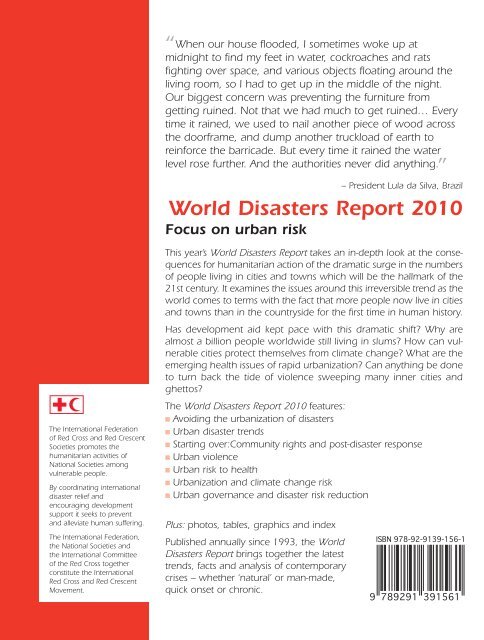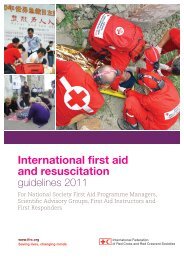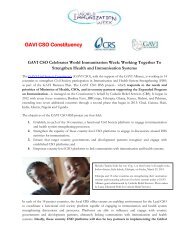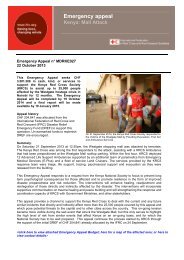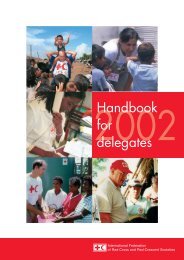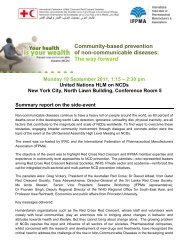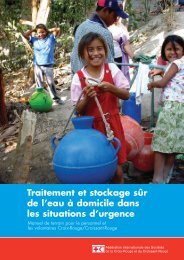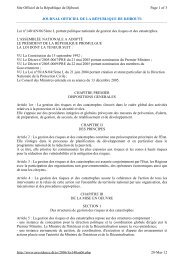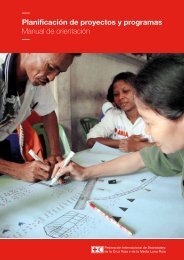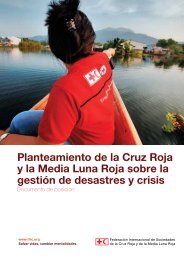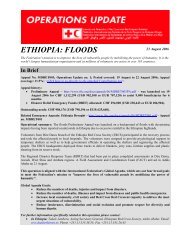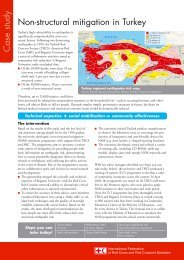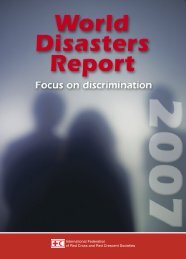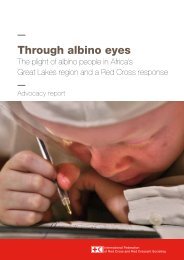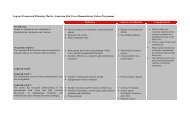World Disasters Report 2010 - International Federation of Red Cross ...
World Disasters Report 2010 - International Federation of Red Cross ...
World Disasters Report 2010 - International Federation of Red Cross ...
You also want an ePaper? Increase the reach of your titles
YUMPU automatically turns print PDFs into web optimized ePapers that Google loves.
The <strong>International</strong> <strong>Federation</strong><br />
<strong>of</strong> <strong>Red</strong> <strong>Cross</strong> and <strong>Red</strong> Crescent<br />
Societies promotes the<br />
humanitarian activities <strong>of</strong><br />
National Societies among<br />
vulnerable people.<br />
By coordinating international<br />
disaster relief and<br />
encouraging development<br />
support it seeks to prevent<br />
and alleviate human suffering.<br />
The <strong>International</strong> <strong>Federation</strong>,<br />
the National Societies and<br />
the <strong>International</strong> Committee<br />
<strong>of</strong> the <strong>Red</strong> <strong>Cross</strong> together<br />
constitute the <strong>International</strong><br />
<strong>Red</strong> <strong>Cross</strong> and <strong>Red</strong> Crescent<br />
Movement.<br />
“ When our house flooded, I sometimes woke up at<br />
midnight to find my feet in water, cockroaches and rats<br />
fighting over space, and various objects floating around the<br />
living room, so I had to get up in the middle <strong>of</strong> the night.<br />
Our biggest concern was preventing the furniture from<br />
getting ruined. Not that we had much to get ruined… Every<br />
time it rained, we used to nail another piece <strong>of</strong> wood across<br />
the doorframe, and dump another truckload <strong>of</strong> earth to<br />
reinforce the barricade. But every time it rained the water<br />
level rose further. And the authorities never did anything.<br />
– President Lula da Silva, Brazil<br />
<strong>World</strong> <strong>Disasters</strong> <strong>Report</strong> <strong>2010</strong><br />
Focus on urban risk<br />
This year’s <strong>World</strong> <strong>Disasters</strong> <strong>Report</strong> takes an in-depth look at the consequences<br />
for humanitarian action <strong>of</strong> the dramatic surge in the numbers<br />
<strong>of</strong> people living in cities and towns which will be the hallmark <strong>of</strong> the<br />
21st century. It examines the issues around this irreversible trend as the<br />
world comes to terms with the fact that more people now live in cities<br />
and towns than in the countryside for the first time in human history.<br />
Has development aid kept pace with this dramatic shift? Why are<br />
almost a billion people worldwide still living in slums? How can vulnerable<br />
cities protect themselves from climate change? What are the<br />
emerging health issues <strong>of</strong> rapid urbanization? Can anything be done<br />
to turn back the tide <strong>of</strong> violence sweeping many inner cities and<br />
ghettos?<br />
The <strong>World</strong> <strong>Disasters</strong> <strong>Report</strong> <strong>2010</strong> features:<br />
� Avoiding the urbanization <strong>of</strong> disasters<br />
� Urban disaster trends<br />
� Starting over:Community rights and post-disaster response<br />
� Urban violence<br />
� Urban risk to health<br />
� Urbanization and climate change risk<br />
� Urban governance and disaster risk reduction<br />
Plus: photos, tables, graphics and index<br />
Published annually since 1993, the <strong>World</strong><br />
<strong>Disasters</strong> <strong>Report</strong> brings together the latest<br />
trends, facts and analysis <strong>of</strong> contemporary<br />
crises – whether ‘natural’ or man-made,<br />
quick onset or chronic.<br />
”


